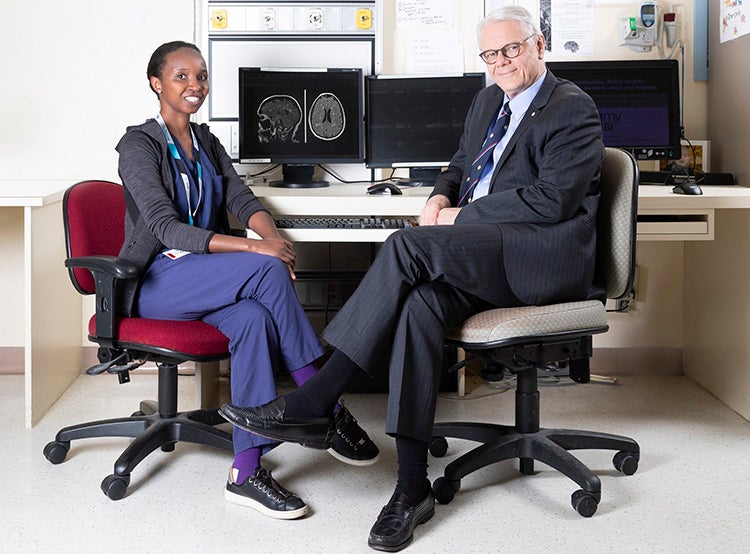'The ripple effect is continually expanding': U of T’s Prakash Fellowship for global surgery

Published: May 23, 2018
Dr. Grace Muthoni is one of Kenya’s two formally trained pediatric neurosurgeons – for a population of more than 48 million people.
When she returns to her country after completing a year-long University of Toronto fellowship, she will bring crucial neuro-technology skills as well as access to a newly formed international professional network. All this adds to her continued resolve to transform lives.
“Children with no access to this care are dying or debilitated by otherwise curable brain tumours, drug-resistant epilepsy and other congenital abnormalities,” she says. “I’m gaining a global perspective, so I can become a local solution and make a difference in my country.”
Through the A.K. Prakash Fellowships in International Medicine, Muthoni is among a growing cohort of doctors who train in a surgical specialty at U of T and one of the nine fully affiliated teaching hospitals for six months or a year, before returning to their low- or middle-income countries to build and strengthen clinical care and education.
This month, all current and former A.K. Prakash Fellowship recipients – from Zimbabwe, Nigeria, Ethiopia, Trinidad and Kenya – will gather in Toronto to attend the Bethune Roundtable in Global Surgery meeting.
“Hearing of the impact our fellows are having is just incredible,” says Ash Prakash, who funds the fellowships and is providing travel scholarships to bring these global surgeons to Toronto again and together for the first time. “They’re improving care, and also launching their own training programs in their countries – the ripple effect is continually expanding.”
Prakash alumni integrate specialized procedures, such as minimally invasive laparoscopic surgery and complex pelvic and hip socket fracture management, into clinical care within their countries. They also build local capacity by establishing residency and fellowship programs of their own, as well as developing regional professional associations and partnerships – multiplying the impact of their U of T training.

Dr. Grace Muthoni and Dr. James Rutka, U of T's chair of the department of surgery, who has supervised Prakash Fellowship recipients (photo by Matt Volpe)
As one example, Prakash orthopedic surgery alumnus Dr. Sami Hailu has created a specialized fracture management centre in Ethiopia, transforming his hospital into a regional training centre for managing pelvic and hip socket fractures. And along with another Prakash alumnus, Dr. Geletaw Tessema, he started a trauma fellowship in Ethiopia, teaching trainees from Ethiopia as well as from neighbouring countries. They’re bringing the country’s cadre of trauma surgeons up from a total of two.
For Hailu, this progress is personal. Just weeks after graduating from medical school, he was in a serious car accident, breaking multiple bones in his thigh and foot. He was told only one surgeon in the country was able to fix his bones properly. “That was when I promised myself to study orthopedics and bring about change in care,” he says.
He’s just getting started. As he builds on his clinical care and fellowship programs, he’s also working with the government to develop a nationwide trauma system and travelling internationally to give courses, including in Kenya and the United States.
Meanwhile, another Ethiopian former Prakash Fellowship recipient, Dr. Tihitena Negussie Mammo, is enhancing the country’s capacity in pediatric surgery, most notably by offering new minimally invasive laparoscopic surgeries, and launching a residency program.
“Half our population in Ethiopia lies in the pediatric age group, and yet the number of well-trained pediatric surgeons is limited,” she says. “The U of T fellowship has allowed us to improve our postgraduate training and double the number of qualified pediatric surgeons – with some of them moving out of the capital Addis Ababa to different regions of the country.”
The Prakash Fellowship launched in 2013. One of the first recipient was Zimbabwe’s Dr. Faith C Muchemwa, who became one of the country’s two plastic surgeons and has plans to build the country’s capacity in reconstructive procedures such as burn care and congenital malformations. The other was Nigeria’s Dr. James A Balogun, who returned to train residents and medical students in pediatric neurosurgery and is leading a new professional group within the Society for Neuro-Oncology Sub-Saharan Africa focused on brain and spinal cord tumours.
“We’ve learned so much from the fellows who have come,” says Dr. James Rutka, a professor and chair of the department of surgery in U of T's Faculty of Medicine who has supervised Prakash Fellowship recipients. “Many of them are establishing training programs and clinical centres and meeting urgent patient needs in their countries.”
For U of T President Meric Gertler, such stories drive home the value of building international partnerships – one of the university’s top strategic priorities. “The Prakash Fellowships provide a wonderful example of the power of philanthropy in the advancement of the University of Toronto as a major force for good in our world,” he says. “We are so grateful to Ash Prakash for his tremendous generosity and vision.”
As for Muthoni, she’s optimistic about her return to Kenya – and is looking forward to meeting her Prakash Fellowship alumni community this month.



